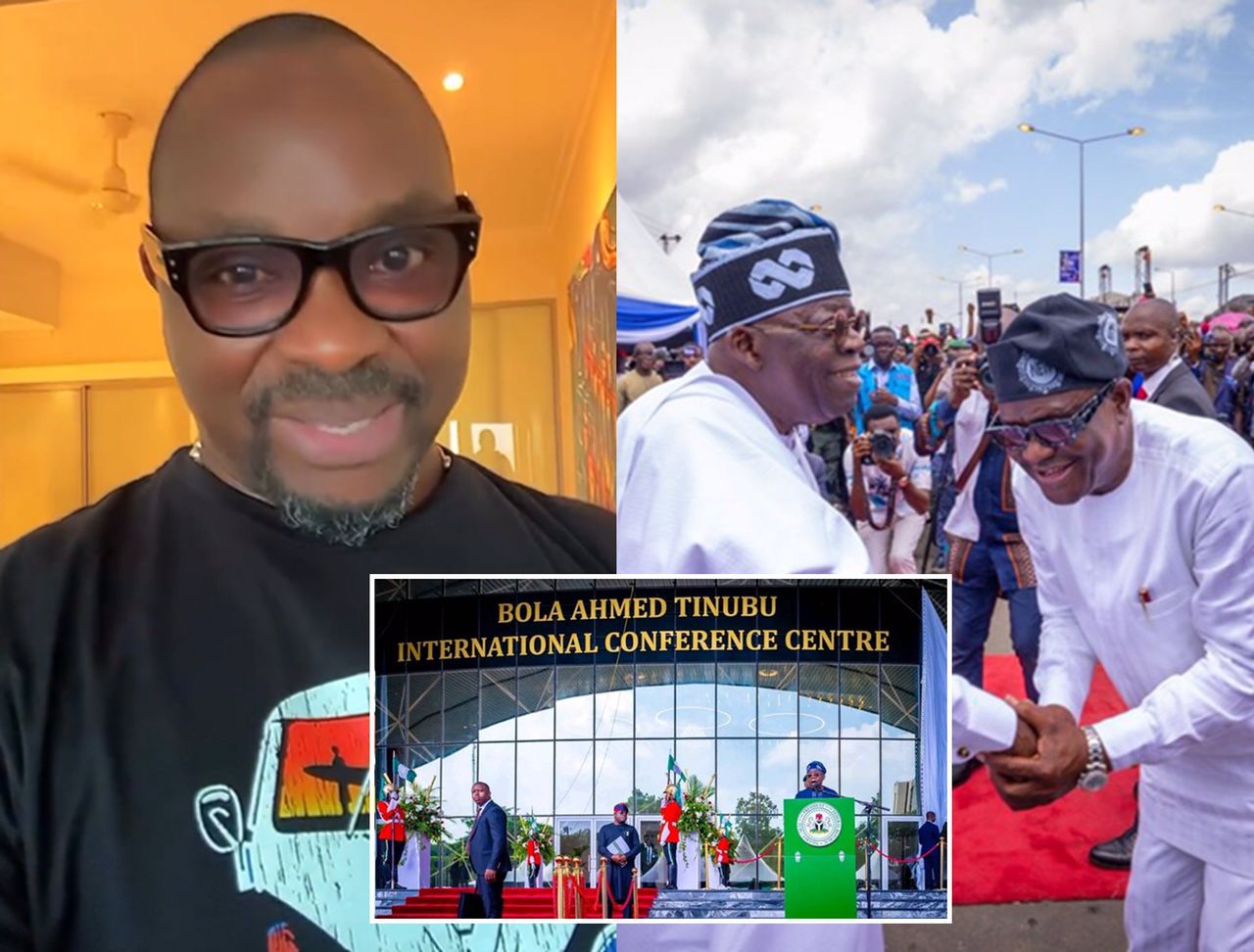
₦39 Billion for Renovation? Isaac Fayose Slams Wike and Tinubu Over ICC Abuja Upgrade, Recalls Babangida’s Humility

In a bold and fiery commentary that has ignited conversations across social media and political circles, Isaac Fayose, brother of former Ekiti State Governor Ayodele Fayose, has publicly criticized the ₦39 billion renovation of the International Conference Centre (ICC) in Abuja. He pointedly called out both President Bola Ahmed Tinubu and Minister of the Federal Capital Territory (FCT), Nyesom Wike, for what he described as an extravagant and misplaced use of public funds, especially during a time when millions of Nigerians are grappling with economic hardship. Fayose’s frustration was encapsulated in a simple but powerful statement that has since gone viral: “The person wey build am no name am after himself.”
The statement, delivered in Nigerian Pidgin English, refers to former military president Ibrahim Badamasi Babangida, who commissioned the ICC in 1991 at a reported cost of ₦240 million. Fayose drew a sharp contrast between Babangida’s apparent humility and the current administration’s decision to pour an eye-watering ₦39 billion into a renovation project that has raised more questions than answers. For many Nigerians, the real issue isn’t whether the ICC deserves a facelift, but why such a staggering sum is being spent in a country where the minimum wage is still under intense debate and basic infrastructure remains in disrepair.
The ICC, located in the heart of Abuja, has long been a symbol of national pride—a center for international summits, state functions, and high-level conferences. But to Fayose and many critics, the newly unveiled renovations seem more symbolic of government excess and tone-deafness in a time of widespread economic strain. “₦39 billion to renovate one building? When the same structure was originally built with ₦240 million? Wetin dem put for there—gold ceiling?” one outraged commenter wrote on X (formerly Twitter), echoing the sentiments of a population that has grown increasingly weary of government spending that appears disconnected from the people’s daily realities.
Isaac Fayose didn’t hold back in his criticism, stating that those in power today are more concerned with vanity and legacy projects than with addressing Nigeria’s real and pressing challenges. “When IBB built the ICC, he didn’t call it 'IBB Conference Centre.’ He didn’t even put his face on the building,” Fayose said, highlighting what he sees as a lack of humility and public-spiritedness among today's political leaders. According to Fayose, Babangida’s decision to remain in the background speaks volumes about the kind of leadership Nigeria desperately needs but no longer sees.
Social media lit up in the wake of Fayose’s comments, with many Nigerians using the opportunity to express their frustration over what they see as systemic waste. Some users asked if the cost of the renovation was inflated to include kickbacks and insider deals—a familiar accusation in a country where transparency and accountability in public procurement are often sorely lacking. Others pointed out that the same amount of money could have been used to build several state-of-the-art hospitals, rehabilitate thousands of schools, or provide social welfare programs to cushion the economic impact of fuel subsidy removal and naira devaluation.
Defenders of the administration, however, argue that the ICC is a national monument that hosts world leaders and must be kept in top shape. According to these voices, ₦39 billion might seem excessive on the surface but could be justified by the scope of the work done, including advanced security installations, modernized facilities, structural upgrades, and international-standard amenities. “We must also consider inflation and currency value over time,” one government sympathizer wrote online. “₦240 million in 1991 is not the same as ₦240 million today. Let’s not politicize development.”
Yet, the optics remain troubling. Nigeria is facing its worst cost-of-living crisis in decades. Food prices have skyrocketed, fuel is unaffordable for many, and unemployment continues to plague the youth. In such a climate, a ₦39 billion renovation feels not only extravagant but provocative. It’s hard for many Nigerians to reconcile the state of their pockets with what appears to be luxury spending in the corridors of power.
What makes Fayose’s criticism especially resonant is the symbolism behind the ICC itself. Built by a military ruler who now rarely enters the political fray, the ICC stands as a quiet reminder of a different era—flawed, certainly, but perhaps less obsessed with personal glorification. The idea that Babangida didn’t name the center after himself has struck a chord with many Nigerians who are disillusioned by today’s leadership culture, where politicians often rush to name airports, bridges, and universities after themselves while doing little to improve lives on the ground.
Observers also point to the timing of the announcement, which comes just months after Wike, a former governor of Rivers State known for his combative political style, assumed his new role as FCT Minister. Since taking office, Wike has promised to “beautify” Abuja and has championed numerous urban renewal projects. While some applaud his drive and ambition, others question whether his priorities align with the pressing needs of average Nigerians, particularly those living in satellite towns without basic amenities.
President Tinubu, meanwhile, has remained largely silent on the matter, leaving the public to draw their own conclusions. With his administration already under pressure to deliver on campaign promises and manage a turbulent economy, the ICC controversy is yet another potential dent in the image of a government trying to maintain both reformist credibility and popular support.
As the backlash grows, Fayose’s words continue to echo across platforms, from blogs to WhatsApp groups: “The person wey build am no name am after himself.” It’s more than a criticism—it’s a rallying cry for a return to modesty in public service, for leaders who prioritize substance over spectacle, and for accountability in the stewardship of national resources. Whether or not the government responds directly, one thing is certain: Nigerians are watching, and they are no longer afraid to speak up.


